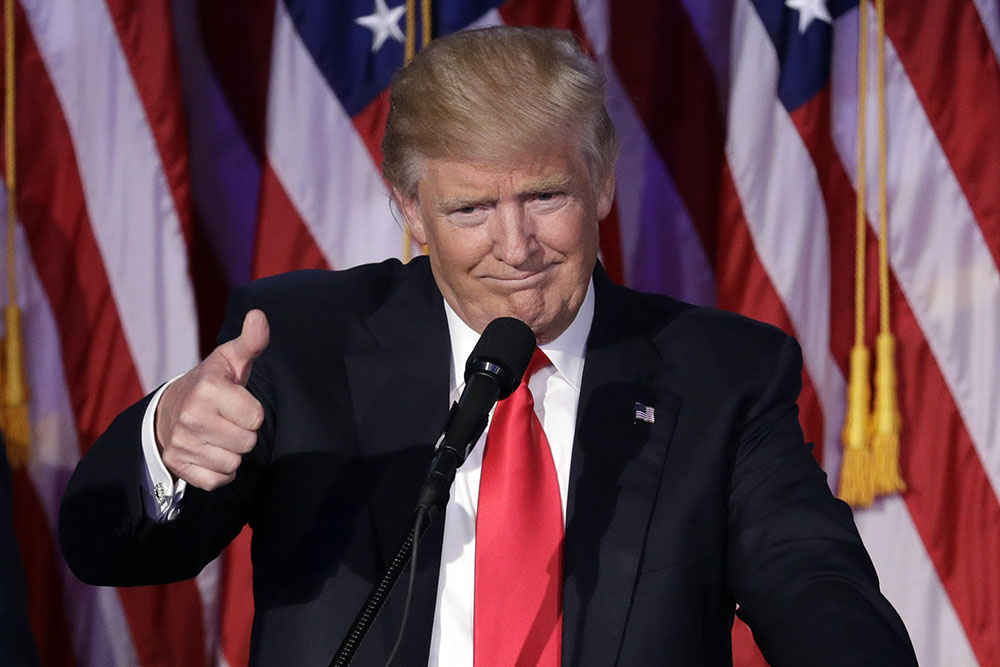North America mulls soccer World Cup bid in the Trump era

US President Donald Trump | AP File Photo
GENEVA — When Donald Trump was just a presidential candidate, there was a belief in soccer that the United States, Mexico and Canada would be a strong choice to team up for a North American bid to host the 2026 World Cup.
That still holds, even now the candidate is now President Trump.
A widely speculated three-way hosting bid by Canada, the U.S and Mexico looks a good option for FIFA. It might yet be the only credible bid — albeit one needing federal governments' support to keep teams, officials and hundreds of thousands of visiting fans safe and secure.
Those visitors — and likely some players — will be from countries that President Trump's administration says are today not welcome.
There is broad agreement in FIFA circles that a World Cup in North America is overdue.
In 2026, it will be 32 years since the regional soccer body known as CONCACAF last had its turn, at the U.S.-hosted 1994 World Cup. The four other continental confederations able to host will have all had at least one turn since then.
What's more, FIFA has barred Europe and Asia from entering the 2026 race by a rule that encourages giving a fair shot to all.
South America and Africa can bid. But South American soccer leaders prefer a centenary World Cup in 2030 including original host Uruguay, and bidding experts say privately that Africa is not a realistic option this time round.
And now the 2026 World Cup will have 48 teams instead of 32, there is even more demand for FIFA-standard stadiums, training camps, hotels and transport links for teams, officials and spectators.
The hosting rights are currently set to be decided by FIFA's 211 member federations in May 2020 — during campaigning for the next U.S. presidential election.
Here are some things to know about the 2026 World Cup, and how it could be affected by President Trump, who will no longer be president in 2026.
RULES OF ENGAGEMENT
Right now, there is no official 2026 World Cup bidding contest.
No FIFA invitation to potential bidders. No American pledge to enter. No formal deals to work with either or both of Mexico and Canada.
More should be known in May. FIFA has said it "defined a set of principles for countries to bid" with new emphasis on human rights compliance after consulting with a Harvard University professor.
The rules should be announced around its annual congress, on May 11 in Manama, Bahrain.
Expect officials from the U.S., Canada and Mexico to be the center of attention. It is for them to lead a member federation's bid, not governments.
Still, FIFA seeks assurances that lawmakers will support staging a month-long tournament where federal planning and spending on security is vital.
In the most recent World Cup bid contests, Russia's then-prime minister Vladimir Putin and Qatar's then-Emir were closely tied to their winning bids and were in Zurich to celebrate.
Former President Bill Clinton lobbied in Zurich to support the American 2022 bid which lost a final-round vote to Qatar.
WHY DOES THE U.S. WANT TO BID?
The World Cup will be the most-watched sports event in 2026. The final draws a verified audience of at least one billion viewers to watch some of the game.
If it is mostly hosted in the United States, it will set tournament records for attendance and commercial income for FIFA.
Hundreds of thousands of visitors would travel to join Americans watching 48 teams play 80 matches over 32 days.
In the 12 host cities — perhaps eight or 10 in the U.S. if co-hosting is approved — and elsewhere, the opportunity to build a stronger soccer culture will be huge.
The 2026 World Cup has seemed destined for the U.S. since the Dec. 2, 2010 loss to Qatar.
Ever since, CONCACAF leaders have said the World Cup must eventually return to the region. That feeling survived the soccer body's turmoil and rehabilitation after many officials were removed by the ongoing U.S. Department of Justice investigation of bribery in international soccer.
Three weeks ago, the prospect of American-led hosting improved when FIFA agreed to add 16 more teams in 2026. That extra organizational load can be carried only by hosts with high-level infrastructure, or willing to fund a multi-billion dollar building spree.
The U.S. could do it alone. It is unlikely Canada or Mexico could.
Three-way co-hosting shapes as an appealing and more diplomatic path for the diverse FIFA membership.
GOOD NEIGHBORS
The North American option is safe and bankable for FIFA, and a strong message was sent on Jan. 10.
The U.S. and Canadian soccer presidents, Sunil Gulati and Victor Montagliani, were in the FIFA Council room deciding to expand to 48 teams.
Mexico's soccer president, Decio de Maria, also made the trip to Zurich, and took part in informal three-way talks.
The signal was clear, and it helps that both Gulati and Montagliani are fluent Spanish speakers.
There is warmth across North American soccer that is currently missing between President Trump and Mexico's President Enrique Pena Nieto, who abruptly canceled a planned visit to Washington this week.
No one is yet ready to confirm that three-way hosting is on, but no one will rule it out.
"We will look at it. We have great relationships with Canada and Mexico," Gulati said in October.
Border issues and a big wall between the U.S. and Mexico could be problematic for a co-hosted World Cup.
National security is always the responsibility of major sports event hosts and FIFA would not want two administrations which are unable to cooperate on World Cup projects.
VISA ISSUES
Of the seven Muslim-majority countries subject to Trump's executive order banning entry to the U.S., which might qualify for a 2026 World Cup?
Iran and Iraq, maybe, on current form.
Algeria, Egypt, Morocco, Saudi Arabia, Tunisia and Uzbekistan are also contenders for an expanded lineup.
World soccer has had issues and found solutions to previous entry visa problems for fans and officials.
FIFA insisted Russia should ease its strict visa application process as a condition of hosting the 2018 World Cup. A law signed last year calls for fans buying tickets to get an ID number instead of a visa from the government.
The FIFA meeting in May in Bahrain has already been affected by visa problems. The original venue of Kuala Lumpur was withdrawn by Malaysia, citing problems allowing entry to some delegates, including officials from Israel.
TRUMP'S PERSONAL SUPPORT
Gulati and Montagliani have spoken cautiously about having faith in Trump's support of sports.
"We will work with him," Gulati said on the sidelines of a U.S. vs. Mexico World Cup qualifying match days after his election. "A bid, if it should happen, relies heavily on cooperation with the government in a number of areas. I look forward to working with (President Trump). He is an avid sports fan."
"A big sports guy and he's proven that in the past," Canada's Montagliani official said at FIFA on Jan. 10 of the U.S. President.
As president-elect, Trump offered backing for Los Angeles' 2024 Olympics host bid which is decided in September.
When the U.S. last bid for the World Cup, Trump was the long-time landlord to CONCACAF in Trump Tower on Fifth Avenue. The soccer body has since left Manhattan for Miami.
Trump Tower also housed the now-disgraced Chuck Blazer, then the most senior American at FIFA during the 2018-2022 bidding, and the star cooperating witness in the DoJ's case that rocked FIFA since May 2015.
One indicted suspect in the case still resides in Trump Tower under house arrest: Jose Maria Marin was chairman of 2014 World Cup organizing committee in his native Brazil.
- Latest
- Trending





























